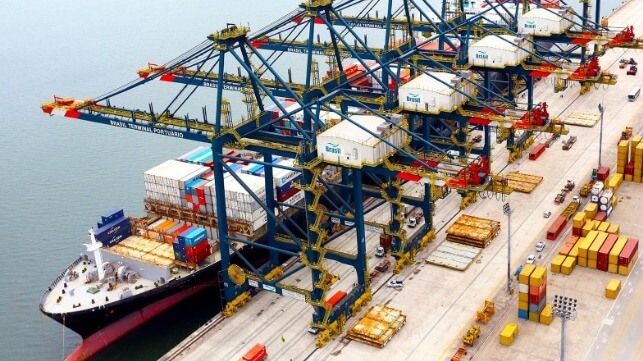Brazil's ABTP Renews Complaint that Maersk and MSC Dominate Market
Port Association files regulatory complaint ahead of the pending terminal privatization in the Port of Santos

Brazilian companies have been working to block the efforts by Maersk and MSC to expand their terminal and logistics operations including further acquisitions in Brazil. In their latest move, the Brazilian Port Terminal Association (ABTP) filed a request 10 days ago with regulators calling for an investigation into the business practices of the two container shipping giants.
“We decided to request an investigation into MSC and Maersk on the suspicion that they are abusing their dominance in maritime container transport to favor their own container terminals along the coast, raising costs and reducing options for cargo flow in Brazil,” ABTP president Jesualdo Conceição da Silva told BNamericas. The trade association, which says it represents 72 companies operating more than 233 terminals in Brazil, is accusing Maersk and MSC of “anti-competitive practices” saying that they are favoring terminals they operate for container volumes driving up costs for shippers bypassing lower cost competitors.
Maersk and MSC have repeatedly denied the accusations saying the majority of their container volume is handled by independent operators. Both companies argue they are space constrained and need to expand terminal operations to keep up with the flow of goods.
The trade association is seeking to call attention to its legal request to investigate the impact of the business practices of the two container shipping companies on the country’s economy. The request was filed with the Administrative Economic Defense Council (CADE), the government agency which oversees and regulates competition and trade in Brazil.
In 2021, the trade association says that combined Maersk and MSC were responsible for more than half of all the container movement on the Brazilian coast. Further, through commercial agreements, they contend that the two companies control as much as three-quarters of all the container movements into and out of Brazilian ports. Through their two terminal companies, Maersk and MSC currently operate seven of the 19 primary terminals in Brazil. Maersk has also recently won rights to an eighter terminal, located at the Port of Suape, as part of Brazil’s ongoing privatization of port operations.
The accusations by ABTP are nothing new as the association has made the same claims previously in its efforts to block Maersk and MSC from bidding on the privatization at the port of Santos. The government in the spring released the terms for the proposed privatization of the STS10 terminal in Santos saying the process would proceed in late 2022. APM Terminals has been operating for nearly a decade in Santos with the current joint venture with MSC’s TIL operating Brasil Terminal Portuário located at the right bank of the Port of Santos. The terminal is currently capable of handling 1.5 million TEUs.

that matters most
Get the latest maritime news delivered to your inbox daily.
The trade organizations have previously attempted to block or limit the participation of Maersk and MSC in the upcoming privatization. Cade however ruled several months ago that the vertical integration of shipowners with port terminals does not harm competition. ABPT threatened in July to take the matter to court.
Brazil’s recent elections may also further complicate the matter. The administration of Brazilian President Jair Bolsonaro had been pushing ahead aggressively with the privatization in an effort to raise badly needed money. Bolsonaro lost his re-election bid 10 days ago to former president Luiz Inácio Lula da Silva who is scheduled to start his third term on January 1, 2023. It is uncertain if the outgoing administration might attempt to push forward the privatization efforts before leaving office and how the new administration would handle the sales after taking office.
